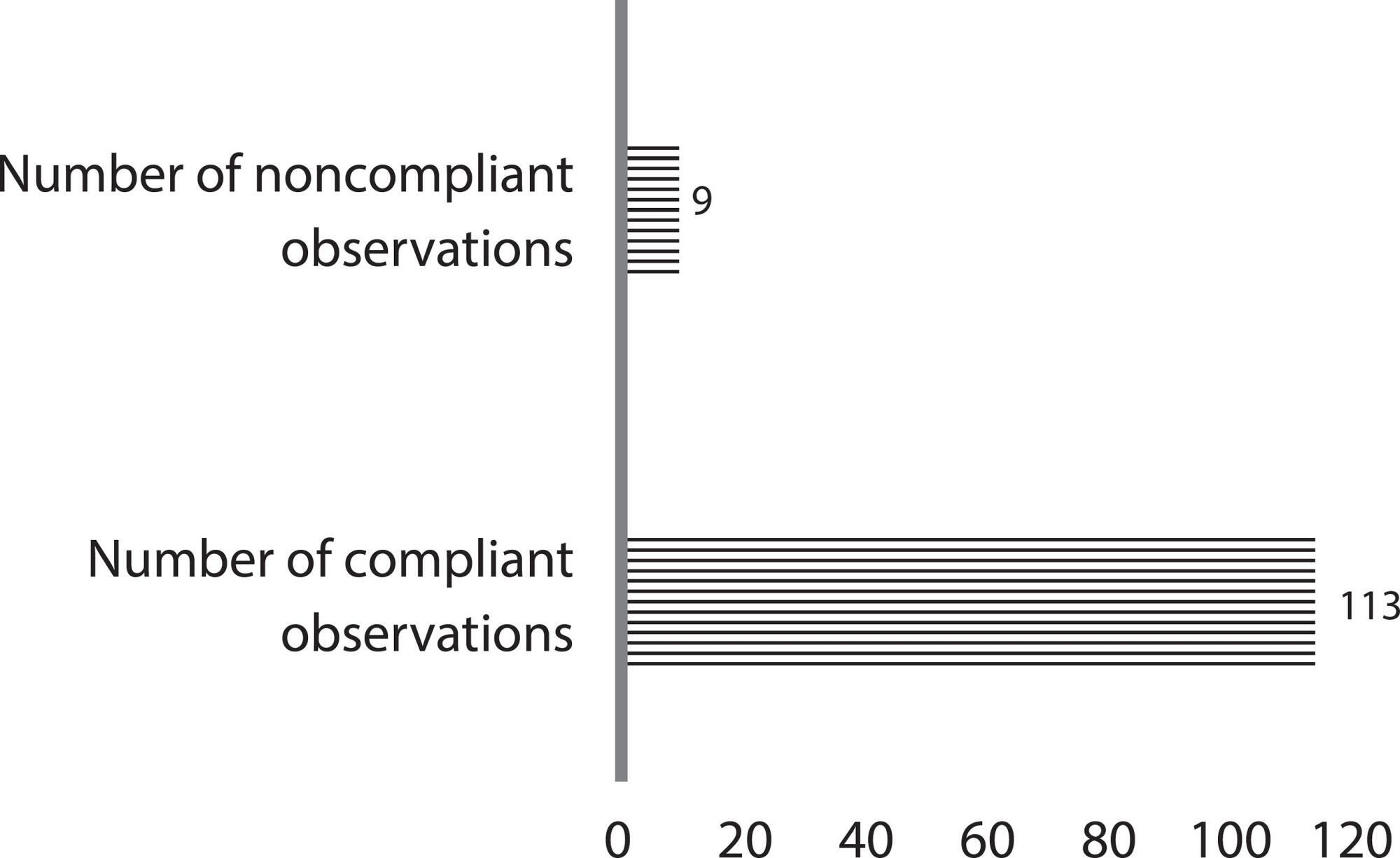-
REVIEW01-01-2017
Nursing process in mental health: an integrative literature review
Revista Brasileira de Enfermagem. 2017;70(1):220-230
Abstract
REVIEWNursing process in mental health: an integrative literature review
Revista Brasileira de Enfermagem. 2017;70(1):220-230
DOI 10.1590/0034-7167-2016-0031
Views0See moreABSTRACT
Objective:
to identify evidences from the literature on the application of nursing process in care developed by the nurse in mental health.
Method:
integrative literature review between 1990 and 2013, in the PubMed, Scopus, CINAHL and LILCACS bases. Descriptors: nursing processes, mental health, nursing care.
Results:
19 papers were identified. Limited and partial usage of the nursing process in care established by a therapeutic relationship that respects the patient’s individuality. We observe care proposals systematized for patients that present pathological aspects in the limits between the physical and psychical, which might be a response to the influence of the practice based on evidences.
Conclusion:
it was found an antagonistic movement between care based on the relationship and located in the standardization of diagnoses that respond to physical malaise. A lack of evidence was verified for the usage of the nursing process in mental health, and we point at the necessity for the creation of new possibilities for dialogue between relational and biological perspectives.
-
REVIEW01-01-2017
Nursing practice in home care: an integrative literature review
Revista Brasileira de Enfermagem. 2017;70(1):210-219
Abstract
REVIEWNursing practice in home care: an integrative literature review
Revista Brasileira de Enfermagem. 2017;70(1):210-219
DOI 10.1590/0034-7167-2016-0214
Views0See moreABSTRACT
Objective:
analyze scientific production on nursing practice in home care.
Method:
integrative review employing databases LILACS, BDENF, IBECS, and MEDLINE. Studies in Spanish, English, and Portuguese were included, regardless of publishing date.
Results:
after analyzing 48 articles, it was found that nursing practice in home care is complex, employing a multitude of actions by using three technologies: soft; soft-hard especially; and hard. Challenges related to the home-care training process are reported in the literature. Nurses use knowledge from their experience and scientific recommendations in conjunction with their reflections on the practice.
Conclusion:
home nursing practice is fundamental and widespread. Relational and educational actions stand out as necessary even in technical care, with a predominant need for home-care training.

-
REVIEW01-01-2017
Nonpharmacological interventions to improve quality of life in heart failure: an integrative review
Revista Brasileira de Enfermagem. 2017;70(1):198-209
Abstract
REVIEWNonpharmacological interventions to improve quality of life in heart failure: an integrative review
Revista Brasileira de Enfermagem. 2017;70(1):198-209
DOI 10.1590/0034-7167-2016-0112
Views0See moreABSTRACT
Objective:
to identify articles that assessed the effectiveness or efficacy of nonpharmacological interventions to improve quality of life of people with heart failure in the literature.
Method:
an integrative literature review was performed in Lilacs, MedLine and SciELO databases, including randomized or nonrandomized clinical trials and quasi-experimental studies published between 2003 and 2014, in Portuguese, English or Spanish.
Results:
twenty-three studies were included. The categories of nonpharmacological interventions that improved quality of life of people with heart failure were: Remote health monitoring, Instructions on health practices, Physical activity follow-up and Traditional Chinese Medicine practices.
Conclusion:
these results can guide the selection of interventions to be implemented by health professionals that treat people with heart failure. Future systematic reviews with meta-analyses are needed in order to identify the most effective interventions for improving these individuals’ quality of life.

-
REVIEW01-01-2017
Quality of working life: assessment of intervention studies
Revista Brasileira de Enfermagem. 2017;70(1):189-197
Abstract
REVIEWQuality of working life: assessment of intervention studies
Revista Brasileira de Enfermagem. 2017;70(1):189-197
DOI 10.1590/0034-7167-2015-0069
Views0See moreABSTRACT
Objective:
to analyze the production of knowledge about interventions on quality of working life.
Method:
integrative review study. The following databases were used for study selection: SciELO, Medline and PubMed.
Results:
the sample included 25 national and international articles that described programs and methods to acquire healthy habits at the workplace and attenuate its mental demands.
Conclusion:
by observing the number of businesses throughout the world, a low number of programs addressing workers’ health and well-being can be found, and the establishment of efficient policies at institutions could improve this situation.

-
REVIEW01-01-2017
Health literacy for people living with HIV/Aids: an integrative review
Revista Brasileira de Enfermagem. 2017;70(1):180-188
Abstract
REVIEWHealth literacy for people living with HIV/Aids: an integrative review
Revista Brasileira de Enfermagem. 2017;70(1):180-188
DOI 10.1590/0034-7167-2015-0052
Views0See moreABSTRACT
Objective:
to analyze knowledge produced by research about health literacy for adult with HIV/Aids.
Method:
an integrative literature review, using six databases, was conducted between January and April of 2014. The descriptors aids and Health Literacy were used, in Portuguese, English and Spanish. A total of 130 articles were found and 14 were selected. Three categories were identified: educational technologies and health literacy for HIV/Aids; assessment of health literacy of patients with HIV/Aids; and health literacy and adherence to antiretroviral therapy.
Results:
analysis of health literacy, socioeconomic status and educational level of people living with HIV/ Aids was essential for implementation of educational strategies that increased adherence to health guidance.
Conclusion:
this study showed the importance of health literacy for working with people living with HIV/Aids, especially considering individuals who did not possess the minimum necessary for survival, which makes it relevant and encourages further research on the topic.

-
REVIEW01-01-2017
Letramento em saúde para pessoas com HIV/Aids: revisão integrativa
Revista Brasileira de Enfermagem. 2017;70(1):180-188
Abstract
REVIEWLetramento em saúde para pessoas com HIV/Aids: revisão integrativa
Revista Brasileira de Enfermagem. 2017;70(1):180-188
DOI 10.1590/0034-7167-2015-0052
Views1See moreRESUMEN
Objetivo:
analizar el conocimiento producido por la investigación sobre la salud de alfabetización para adultos con VIH/SIDA.
Método:
una revisión integradora de la literatura, con seis bases de datos, se llevó a cabo entre enero y abril de 2014. Los descriptores SIDA y Educación de la Salud se utilizaron, en portugués, inglés y español. Se encontró un total de 130 artículos y se seleccionaron 14. Se identificaron tres categorías: tecnologías de la educación y alfabetización de la salud para el VIH/SIDA; evaluación de conocimientos sobre la salud de los pacientes con VIH/SIDA; y conocimientos sobre la salud y la adherencia a la terapia antirretroviral.
Resultados:
análisis de los conocimientos sobre la salud, el estatus socioeconómico y nivel educativo de las personas que viven con el VIH / SIDA era esencial para la implementación de estrategias educativas que el aumento de la adherencia a la orientación de la salud.
Conclusión:
Este estudio demostró la importancia de la alfabetización en salud para trabajar con personas que viven con el VIH / SIDA, especialmente teniendo en cuenta a las personas que no poseen el mínimo necesario para la supervivencia, lo que hace que sea aún más relevante y alienta la investigación sobre el tema.
-
Factors that interfere with the response of nurses in the monitoring of clinical alarms
Revista Brasileira de Enfermagem. 2017;70(1):172-179
Abstract
Factors that interfere with the response of nurses in the monitoring of clinical alarms
Revista Brasileira de Enfermagem. 2017;70(1):172-179
DOI 10.1590/0034-7167-2015-0092
Views0See moreABSTRACT
Objective:
The objective of the present study was to identify and synthesize the best empirical evidence found on factors that influence the response of nurses regarding clinical alarms.
Method:
An integrative literature review was conducted with searches undertaken in ten electronic databases restricted to the period from 2005 to 2016.
Results:
Eight articles were included by cross-checking the descriptors selected.
Conclusion:
In the analysis of the studies, the following possible factors that might interfere with the response of nurses in the monitoring of clinical alarms were found: high number of false alarms, inaudibility of alarms due to the competition of sounds, difficulty in distinguishing the urgency of alarms, and increase in noise caused by the raise in the number of alarms.
-
RESEARCH01-01-2017
Discourses on discharge care for children with special healthcare needs
Revista Brasileira de Enfermagem. 2017;70(1):163-171
Abstract
RESEARCHDiscourses on discharge care for children with special healthcare needs
Revista Brasileira de Enfermagem. 2017;70(1):163-171
DOI 10.1590/0034-7167-2016-0248
Views0See moreABSTRACT
Objectives:
analyze the discourse of healthcare professionals and families on the continuous and complex care for children with special healthcare needs; understand hospital discharge as a process centered on children demands and family learning.
Method:
qualitative research conducted between 2013 and 2015 through semi-structured interviews, document analysis and the sensitive creative method; the participants were ten children with special healthcare needs, six professionals and eleven family members from a public pediatric teaching hospital in Rio de Janeiro. The data underwent critical discourse analysis.
Results:
at discharge, family caregivers should learn innovative care to guarantee the maintenance of their children’s lives at home, but preparation is limited.
Conclusion:
the clinicians and the families pointed out Nurse as the most qualified professional for this preparation, since caring for these children requires nursing care skills.
-
ORIGINAL ARTICLE01-13-2024
Nurses’ perspectives on the use of telemonitoring in the management of people with diabetes and hypertension
Revista Brasileira de Enfermagem. 2024;77(6):e20230481
Abstract
ORIGINAL ARTICLENurses’ perspectives on the use of telemonitoring in the management of people with diabetes and hypertension
Revista Brasileira de Enfermagem. 2024;77(6):e20230481
DOI 10.1590/0034-7167-2023-0481
Views1See moreABSTRACT
Objectives:
to understand the perspective of nurses on the use of telemonitoring in the management of people with type 2 diabetes mellitus and arterial hypertension in primary care.
Methods:
this qualitative research involved sixteen nurses from eight municipalities in Paraná. Data were collected between November 2022 and January 2023 through inperson or remote interviews, which were audio-recorded and subjected to content analysis.
Results:
according to the nurses, telemonitoring enhances users’ knowledge about these conditions, communication and connection with the team, and productivity. However, the lack of electronic resources and equipment, high staff turnover, low user adherence, and the limited availability of professional time present significant challenges.
Final Considerations:
the effective implementation and operation of telemonitoring in the management of people with diabetes and hypertension involve both potential benefits and barriers. It is essential to have the availability of human and technological resources, managerial support, and the commitment of professionals and users.
-
REVIEW12-16-2024
Recommendations for guidelines for promoting mental health in the workplace: an umbrella review
Revista Brasileira de Enfermagem. 2024;77(6):e20240086
Abstract
REVIEWRecommendations for guidelines for promoting mental health in the workplace: an umbrella review
Revista Brasileira de Enfermagem. 2024;77(6):e20240086
DOI 10.1590/0034-7167-2024-0086
Views1See moreABSTRACT
Objectives:
to summarize the recommendations of guidelines for promoting mental health in the workplace.
Methods:
an umbrella review, according to Joanna Briggs Institute and Preferred Reporting Items for Systematic reviews and Meta-Analyses methodological assumptions. Data collection was carried out in January 2021 and updated in July 2023 in the American Psychological Association, Cochrane Library, EMBASE, National Library of Medicine, and Scopus databases. Systematic reviews that assessed guidelines with recommendations for mental health care for workers were included. PROSPERO registration CRD42023461845.
Results:
four systematic reviews published between 2015 and 2018 were identified. The abstracts highlighted actions that facilitate and inhibit the recommendations as well as three categories of intervention: primary prevention – worker protection; secondary prevention – promoting workers’ mental health; and tertiary prevention – supporting, monitoring and rehabilitating workers upon returning to work.
Conclusions:
the interventions are based on prevention, promotion and early recognition, support and rehabilitation of mental health problems.

-
EDITORIAL03-08-2024
Nursing as a player in tackling vaccine hesitancy and refusal
Revista Brasileira de Enfermagem. 2024;77:e77suppl101
Abstract
EDITORIALNursing as a player in tackling vaccine hesitancy and refusal
Revista Brasileira de Enfermagem. 2024;77:e77suppl101
DOI 10.1590/0034-7167.202477suppl101
Views1Since the 1970s, the Brazilian Ministry of Health established the Brazilian National Immunization Program (PNI – Programa Nacional de Imunização), which preceded the Brazilian Health System and which was incorporated and strengthened due to the decentralized model to municipalities, but under single command at central level. Its objective was and still is to coordinate vaccination […]See more -
ORIGINAL ARTICLE12-21-2020
Development of an appearance validity instrument for educational technology in health
Revista Brasileira de Enfermagem. 2020;73:e20190559
Abstract
ORIGINAL ARTICLEDevelopment of an appearance validity instrument for educational technology in health
Revista Brasileira de Enfermagem. 2020;73:e20190559
DOI 10.1590/0034-7167-2019-0559
Views1ABSTRACT
Objectives:
to develop and evaluate the convergence of the instrument for the appearance validity of educational technologies in health.
Methods:
methodological study conducted in two steps. In step 1, the instrument items were developed, with subsequent content validity by nine specialists in the development of educational technologies in health. In step 2, the convergent validity between another instrument and the appearance instrument was performed. Correlation results above r> 0.3 and p <0.05 were considered as plausible convergent validity.
Results:
the ten items of the initial version of the appearance instrument were submitted to content validity that resulted in a final version with 12 items (Content Validity Index = 0.93). The correlation indexes were strong with the objective and appearance domains; moderate with motivation, organization and total; and weak with writing style.
Conclusions:
the appearance instrument demonstrated content validity and convergent validity, in addition to a strong correlation with the other instrument.
Keywords:Educational TechnologyHealth EducationMethodological Research in NursingTechnological DevelopmentValidation StudiesSee more -
EXPERIENCE REPORT08-19-2019
Hypothermia post-cardiopulmonary resuscitation with low inputs: an experience report
Revista Brasileira de Enfermagem. 2019;72(4):1114-1118
Abstract
EXPERIENCE REPORTHypothermia post-cardiopulmonary resuscitation with low inputs: an experience report
Revista Brasileira de Enfermagem. 2019;72(4):1114-1118
DOI 10.1590/0034-7167-2017-0771
Views1ABSTRACT
Objective:
to report the experience of conducting directed temperature control of a post-cardiopulmonary resuscitation patient, with reduced and basic inputs available at the institution.
Method:
an experience report of directed temperature control in patient (age 15 years), after four hours of cardiopulmonary resuscitation in an Intensive Care Unit of a hospital in São Paulo State countryside in 2016, according to the protocol suggested by the American Heart Association, in 2015. There were applications of cold compresses, plastic bags with crushed ice and rectal temperature control.
Results:
after eight hours, temperature had reached 93.2 ºF. Body cooling was maintained for 24 hours. However, bags with crushed ice were used in the first 6 hours.
Conclusion:
conduct of nurses to obtain the body cooling with reduced and basic inputs was effective during the stay at the Intensive Care Unit.
Keywords:Body Temperature RegulationCardiopulmonary ResuscitationHeart ArrestHypothermia InducedIntensive Care UnitsSee more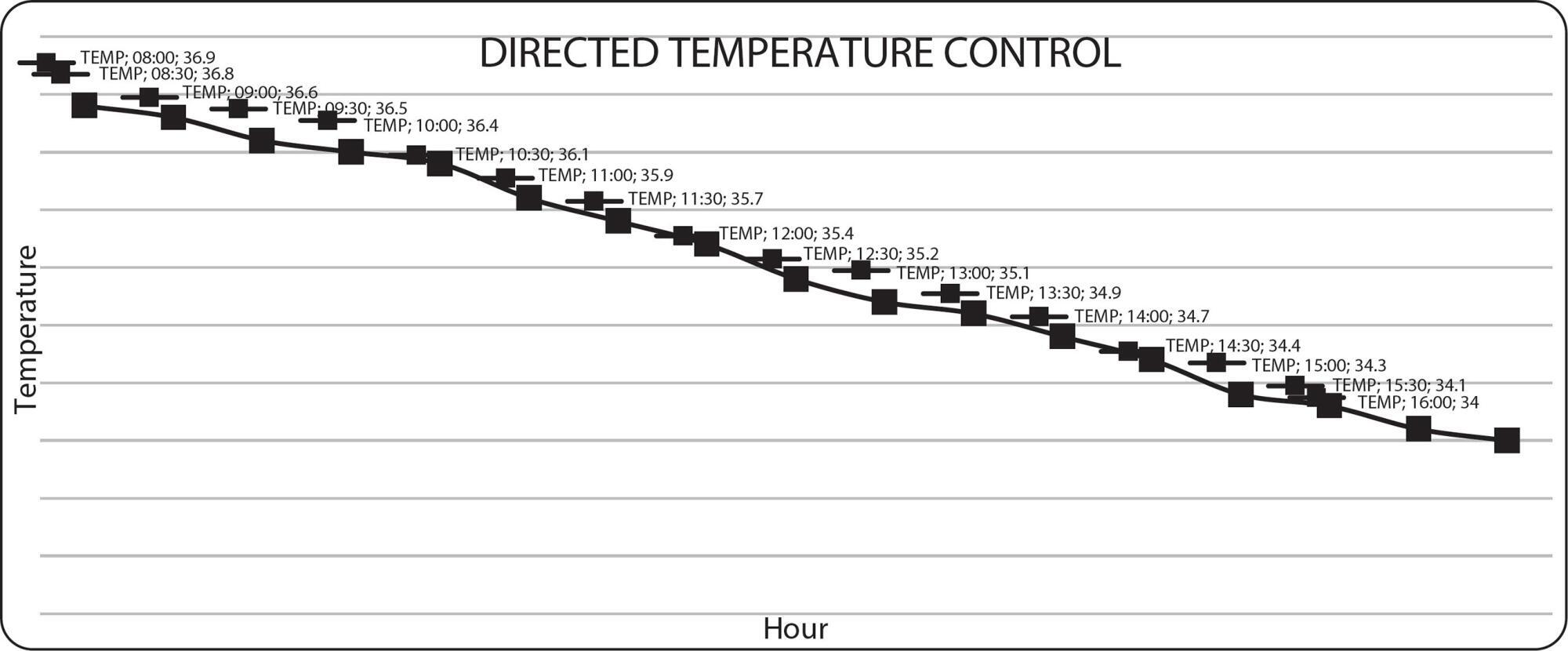
-
ORIGINAL ARTICLE09-16-2019
Spatial analysis on tuberculosis and the network of primary health care
Revista Brasileira de Enfermagem. 2019;72(5):1197-1202
Abstract
ORIGINAL ARTICLESpatial analysis on tuberculosis and the network of primary health care
Revista Brasileira de Enfermagem. 2019;72(5):1197-1202
DOI 10.1590/0034-7167-2017-0897
Views1See moreABSTRACT
Objective:
to analyze the spatial distribution of new cases of tuberculosis compared to the location of the Primary Healthcare Units that performed the compulsory notification.
Method:
ecological study conducted in Belém, Pará, with 5,294 new cases of tuberculosis notified to Sistema de Informação de Agravos de Notificação for the period from 2010 to 2014. The cases were georeferenced using the software applications ArcGis 10.2 and TerraView 4.2.2. The techniques of Kernel density and global Moran geostatistics were used.
Results:
the incidence of tuberculosis cases did not vary significantly between the years studied, however there was a variation in incidence between neighborhoods. Health units that exhibited higher number of notifications can suffer great influence of migration from nearby neighborhoods.
Conclusion:
the spatial dynamics of tuberculosis associated with health services allows to know the areas with increased risk of tuberculosis and the density of notifications of health units.

-
ORIGINAL ARTICLE10-21-2019
Nurses defending the autonomy of the elderly at the end of life
Revista Brasileira de Enfermagem. 2019;72(6):1639-1645
Abstract
ORIGINAL ARTICLENurses defending the autonomy of the elderly at the end of life
Revista Brasileira de Enfermagem. 2019;72(6):1639-1645
DOI 10.1590/0034-7167-2018-0768
Views1See moreABSTRACT
Objective:
to understand how nurses deal with the elderly’s autonomy at the end of life.
Method:
qualitative, exploratory study, guided by the Grounded Theory. Ten nurses, eight doctors and 15 nursing technicians were interviewed between November 2016 and May 2017 at a university hospital in Rio de Janeiro/Brazil.
Results:
nurses deal with the elderly’s autonomy in compliance with the code of ethics and exercise leadership in actions and interactions to defend this right, evaluating, guiding and listening to the preferences of the elderly; interacting with the family; and sharing information with the health team.
Final considerations:
the elderly’s autonomy must be ensured in care planning, based on patient-centered communication and developed in the interaction among agents involved in care. The discussion on “Living Wills” Health Care Directives and principles of palliative care must be encouraged.
-
ORIGINAL ARTICLE12-05-2019
Care complexity in hospitalized elderly according to cognitive performance
Revista Brasileira de Enfermagem. 2019;72:134-139
Abstract
ORIGINAL ARTICLECare complexity in hospitalized elderly according to cognitive performance
Revista Brasileira de Enfermagem. 2019;72:134-139
DOI 10.1590/0034-7167-2018-0357
Views1See moreABSTRACT
Objective:
to investigate possible differences in care complexity, functional performance and biopsychosocial and health system aspects among hospitalized elderly with or without cognitive decline.
Method:
quantitative, cross-sectional and analytical study in which was used the INTERMED method and cognitive and functional screening scales. We investigated 384 elderly patients admitted to a medical and surgical clinic of a University Hospital located in São Paulo/SP.
Results:
cognitive decline was present in 40.1% of the sample, most of them were longer-lived elderly individuals with less schooling and income, more dependent in activities of daily living and had greater vulnerability in different domains of INTERMED. After adjustments, the elderly with cognitive decline presented greater vulnerability in the psychological domain.
Conclusion:
the relationship between cognitive decline and psychological vulnerability highlights the need to adopt long-term care based on involvement of the family, health team and different services, thereby maximizing the quality of care.
-
Contents related to nursing professionals during the COVID-19 pandemic on the Youtube™ platform
Revista Brasileira de Enfermagem. 2021;74:e20200581
Abstract
Contents related to nursing professionals during the COVID-19 pandemic on the Youtube™ platform
Revista Brasileira de Enfermagem. 2021;74:e20200581
DOI 10.1590/0034-7167-2020-0581
Views0See moreABSTRACT
Objective:
to characterize the content of Youtube™ videos related to nursing professionals during the COVID-19 pandemic.
Method:
a qualitative study that examined 47 videos on Youtube™ posted between 11/03 and 11/04 2020, which were subjected to thematic analysis.
Results:
four categories emerged: “the role of nurses in care production during the pandemic”, which addresses the management of services and individual care; “Overview of the pandemic from the perspective of nurses in different countries”, presenting experiences and encouraging physical distance; “Tributes and motivation to mobilize the category”, in addition to targeted tributes, calls for nurses to claim their rights; “Criticisms and demands to improve working conditions”, which highlights the insecurity of care provision settings.
Final considerations:
nursing work conditions in different countries, recognition of the importance of professionals during the pandemic, and claims of the category to improve working conditions were the main content found on Youtube™.
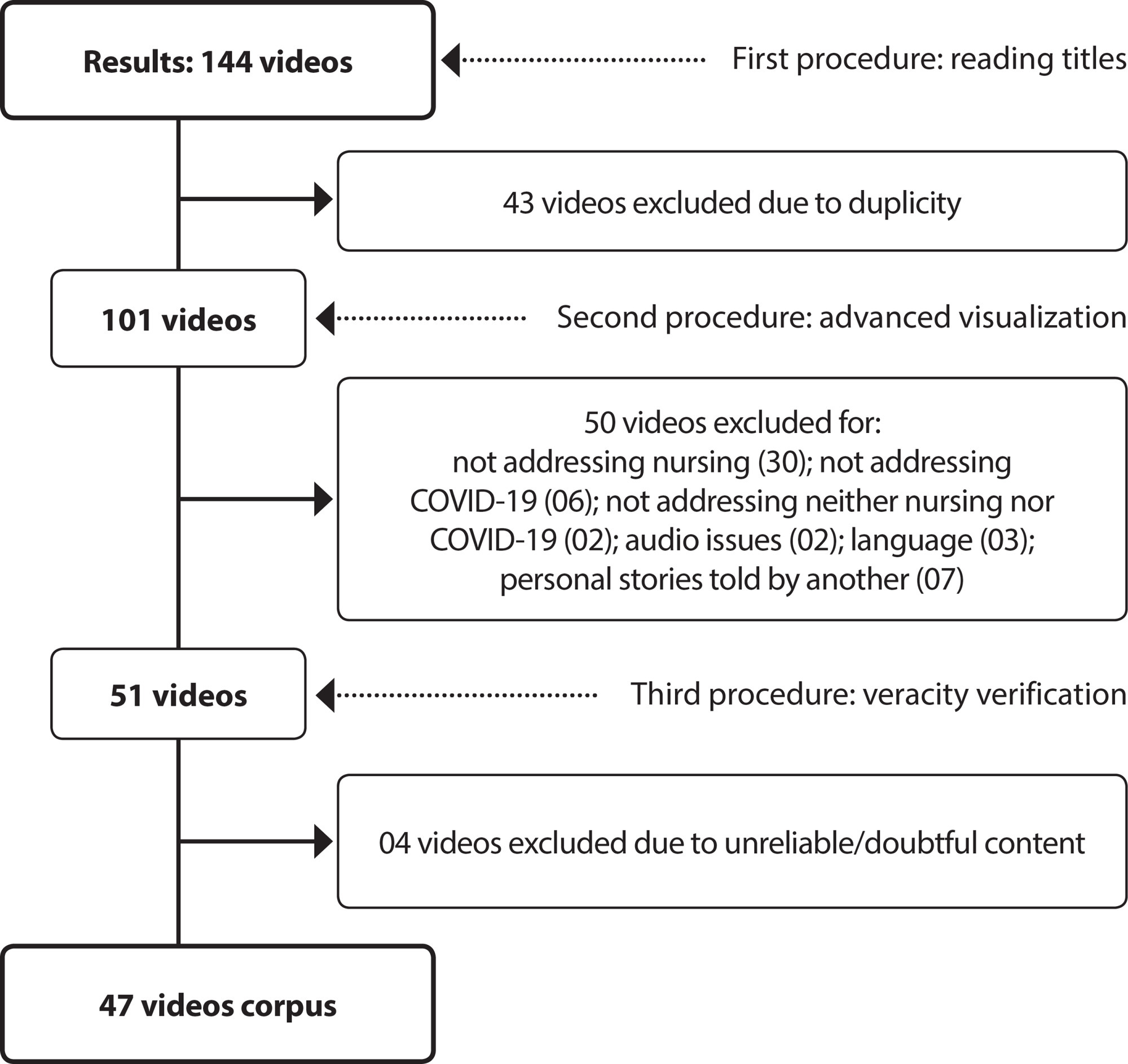
-
REVIEW07-13-2020
Prevention and control measures for neonatal COVID-19 infection: a scoping review
Revista Brasileira de Enfermagem. 2020;73:e20200467
Abstract
REVIEWPrevention and control measures for neonatal COVID-19 infection: a scoping review
Revista Brasileira de Enfermagem. 2020;73:e20200467
DOI 10.1590/0034-7167-2020-0467
Views0See moreABSTRACT
Objective:
to identify with the literature the measures to prevent and control neonatal infection by COVID-19.
Methods:
a scope review carried out by searching for studies in databases and institutional health websites. The final sample was 25 articles.
Results:
among the main measures are the use of masks by suspected or infected people in contact with healthy newborns, hand hygiene before and after each care and feeding as well as the tools used for milking. It is indispensable to use personal protective equipment by health professionals in neonatology services to maintain a private room for infected newborns or to use physical barriers. Early diagnosis and timely case management is essential to reduce virus transmissibility.
Conclusions:
the research contributed to elucidate health and nursing actions in preventing and controlling neonatal infection by COVID-19.

-
REVIEW06-17-2020
Prevention and conduct against the Extravasation of antineoplastic chemotherapy: a scoping review
Revista Brasileira de Enfermagem. 2020;73(4):e20190008
Abstract
REVIEWPrevention and conduct against the Extravasation of antineoplastic chemotherapy: a scoping review
Revista Brasileira de Enfermagem. 2020;73(4):e20190008
DOI 10.1590/0034-7167-2019-0008
Views0ABSTRACT
Objectives:
to identify and synthesize scientific evidence on prevention and management of extravasation of antineoplastic agents in adult patients by nurses.
Methods:
scoping review, according to Joanna Briggs Institute and PRISMA-ScR. Research was conducted in five electronic databases, Cochrane Library and eight catalogs of theses and dissertations. Data collection occurred from April to July 2018, with no time limit. The extracted data were analyzed and synthesized in a narrative way.
Results:
a total of 3,110 records were retrieved and 18 studies were kept for review. Most publications (66.6%) had a qualitative approach and addressed both aspects, i.e., prevention and management of extravasation of chemotherapy in adult patients.
Conclusions:
the implementation of protocols based on scientific evidence on prevention and management of extravasation of antineoplastic agents is paramount in order to provide patient safety and support to the nursing staff.
Keywords:Antineoplastic AgentsCombined ChemotherapyExtravasation of Therapeutic and Diagnostic MaterialsNursing CareOncologySee more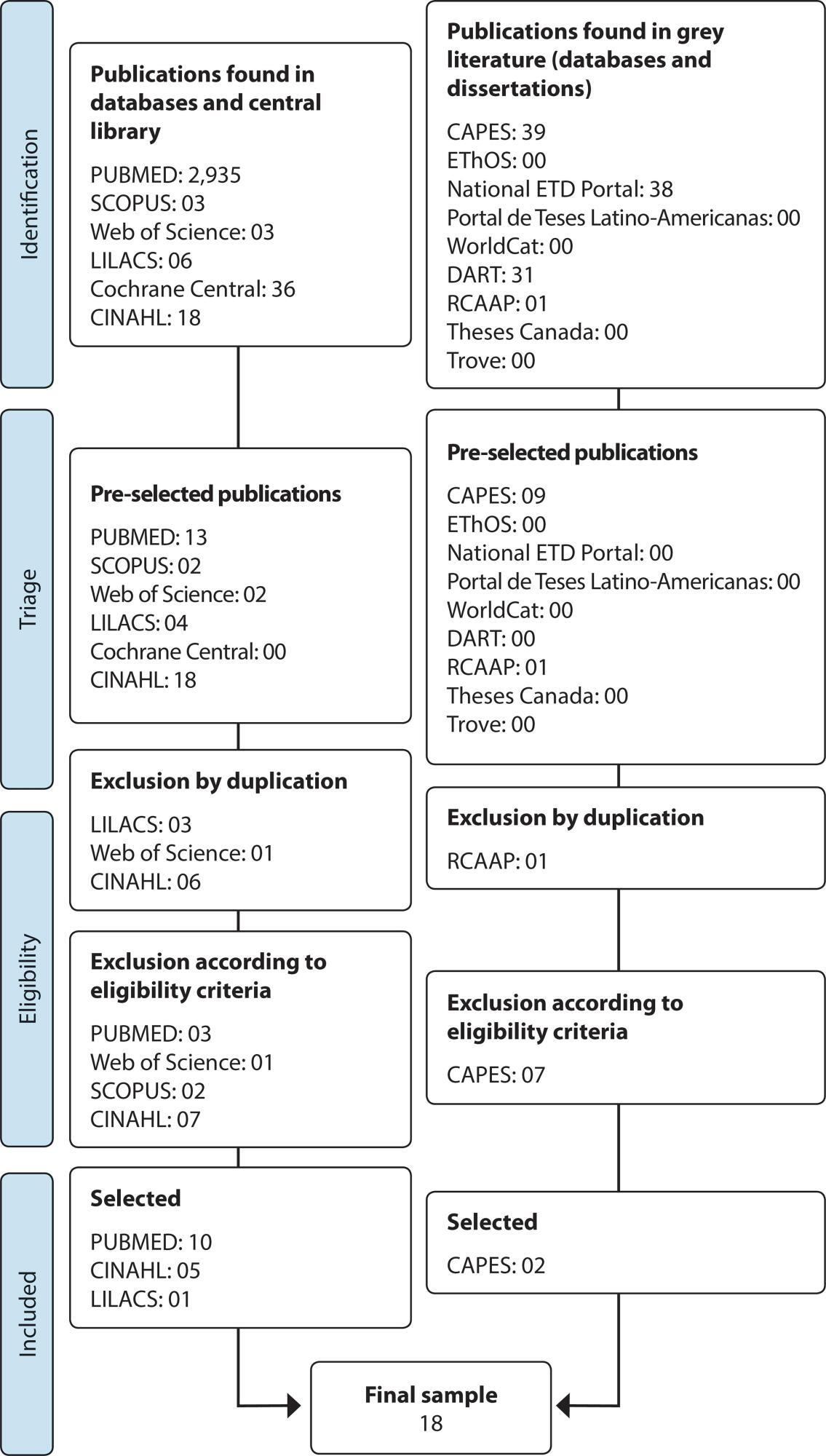
-
REFLECTION09-07-2020
Training and work process in Multiprofessional Residency in Health as innovative strategy
Revista Brasileira de Enfermagem. 2020;73(6):e20190635
Abstract
REFLECTIONTraining and work process in Multiprofessional Residency in Health as innovative strategy
Revista Brasileira de Enfermagem. 2020;73(6):e20190635
DOI 10.1590/0034-7167-2019-0635
Views0ABSTRACT
Objectives: To
reflect about education in health and work process on three programs of multiprofessional residency in Florianópolis/SC.
Method:
Reflexive study about Multiprofessional Residency Health Programs of Florianópolis.
Results:
Multiprofessional Residency characterizes training health professionals through service education. Developing these professionals’ specialization with assignments that promote professional exercise and magnifies multiprofessional work at the same time, for excellency in unabridged healthcare.
Final Considerations:
Multiprofessional Residency Programs make interdisciplinary education, sharing knowledge between residents and other professionals stimulating development of innovation skills.
Keywords:Euducation, GraduateHealth PersonneInternship and ResidencyInterprofessional RelationsProfessional PracticeSee more -
ORIGINAL ARTICLE06-08-2020
Understanding the dramatic therapeutic play session: a contribution to pediatric nursing
Revista Brasileira de Enfermagem. 2020;73(4):e20180812
Abstract
ORIGINAL ARTICLEUnderstanding the dramatic therapeutic play session: a contribution to pediatric nursing
Revista Brasileira de Enfermagem. 2020;73(4):e20180812
DOI 10.1590/0034-7167-2018-0812
Views0See moreABSTRACT
Objectives:
to understand how the dramatic therapeutic play session occurs within the care of hospitalized children.
Methods:
qualitative multiple case study, using theoretical references, such as symbolic interactionism and Vygotsky’s theory of symbolic play. Twenty play sessions performed with six children from 3 to 10 years old were analyzed, each corresponding to one case.
Results:
these sessions demonstrated that a dramatic therapeutic play session is a process of four interdependent and complementary steps: bonding, exploring, dramatizing, and play cessation. They also revealed the imaginary situations externalized by the child, the importance of the exploration step for which they manage the imaginary situation and catharsis, and how her higher psychological faculties are articulated during this process.
Final Considerations:
the results contribute to the understanding of the conduct and analysis of the dramatic therapeutic play session, reinforcing the importance of its use in pediatric nursing care practice.
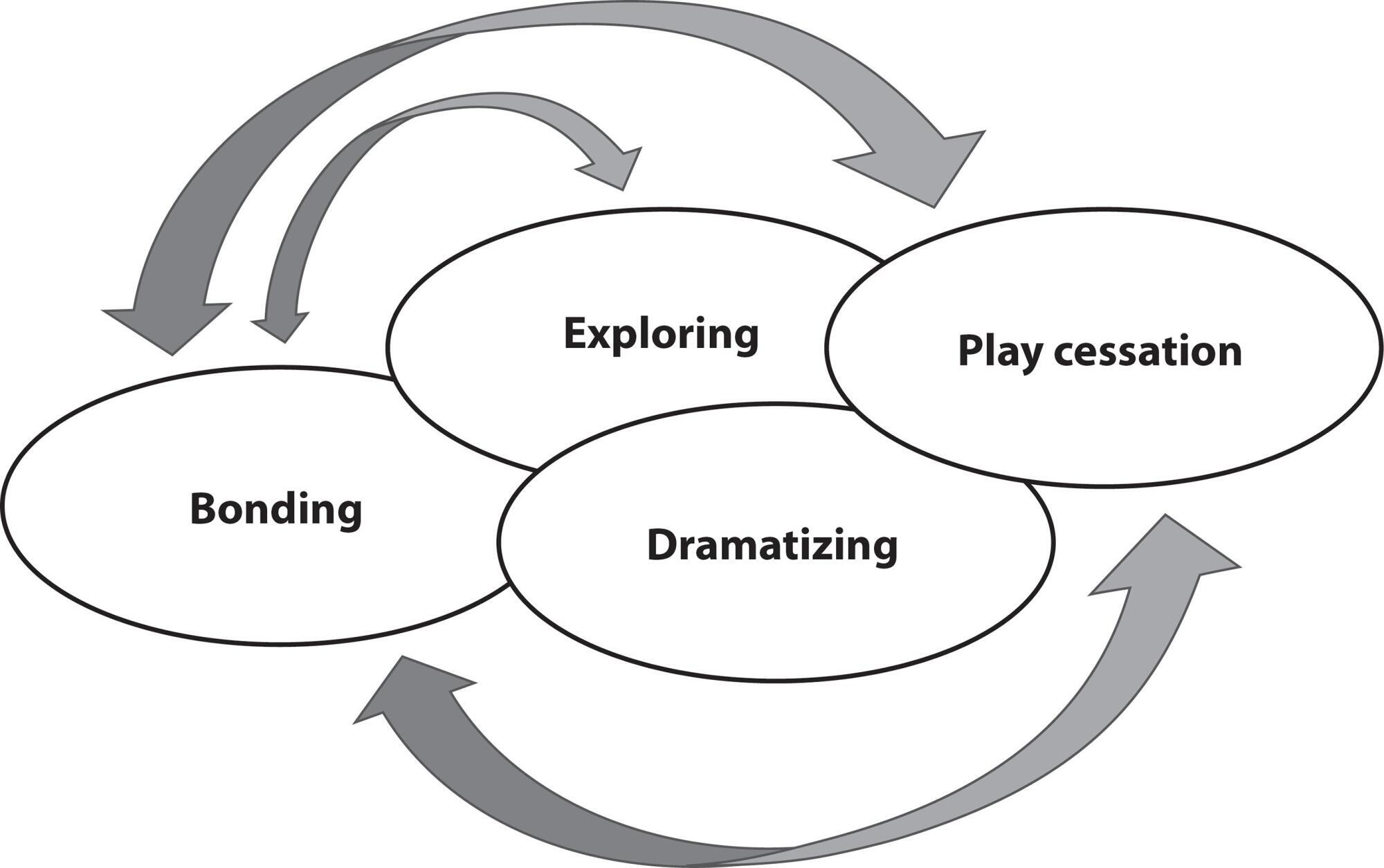
-
ORIGINAL ARTICLE02-10-2020
Common mental disorders in nursing students of the professionalizing cycle
Revista Brasileira de Enfermagem. 2020;73(1):e20180154
Abstract
ORIGINAL ARTICLECommon mental disorders in nursing students of the professionalizing cycle
Revista Brasileira de Enfermagem. 2020;73(1):e20180154
DOI 10.1590/0034-7167-2018-0154
Views0See moreABSTRACT
Objectives:
to verify the suspicion of common mental disorders in nursing students of the professionalizing cycle and the association with sociodemographic features.
Method:
cross-sectional study with a sample of 85 students from a public university in the state of Rio de Janeiro (RJ) who responded to the Self-Report Questionnaire-20 and sociodemographic questions.
Results:
the suspicion prevalence of common mental disorders (CMD) in the sample was 55.3% and it was identified the association with the consumption of alcohol. Of the most frequent SRQ-20 complaints, 95.3% reported “feeling nervous, tense or worried”, 72.9% “having difficulty making decisions”, 60% “sleeping poorly” and 37.6% “having lost interest by things “.
Conclusion:
high prevalence of CMD in the sample and the association with the consumption of alcohol requires preventive and therapeutic actions among the students that minimize the possibility of severe mental disorders related to the consumption of alcohol and other drugs.
Search
Search in:
Nuvem de Tags
Aged (144) Atenção Primária à Saúde (239) COVID-19 (104) Cuidados de Enfermagem (269) Educação em Enfermagem (151) Educação em Saúde (139) Enfermagem (930) Estudos de Validação (131) Health Education (144) Idoso (208) Mental Health (149) Nursing (987) Nursing Care (306) Patient Safety (151) Primary Health Care (284) Qualidade de Vida (104) Quality of Life (106) Saúde Mental (145) Segurança do Paciente (150) Validation Studies (108)




